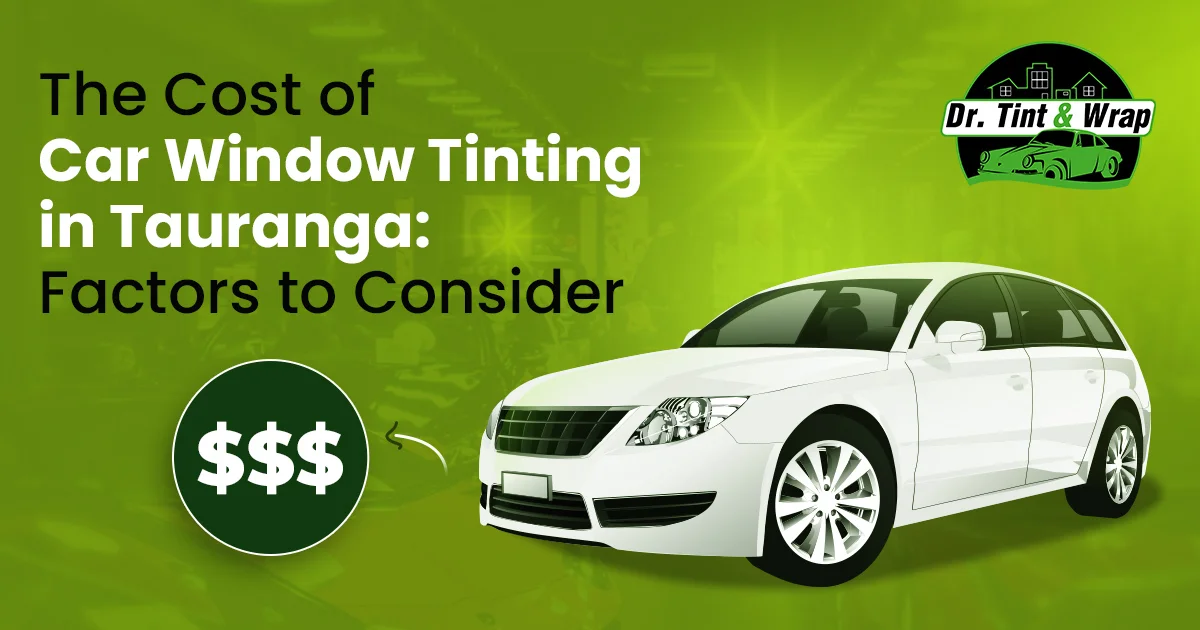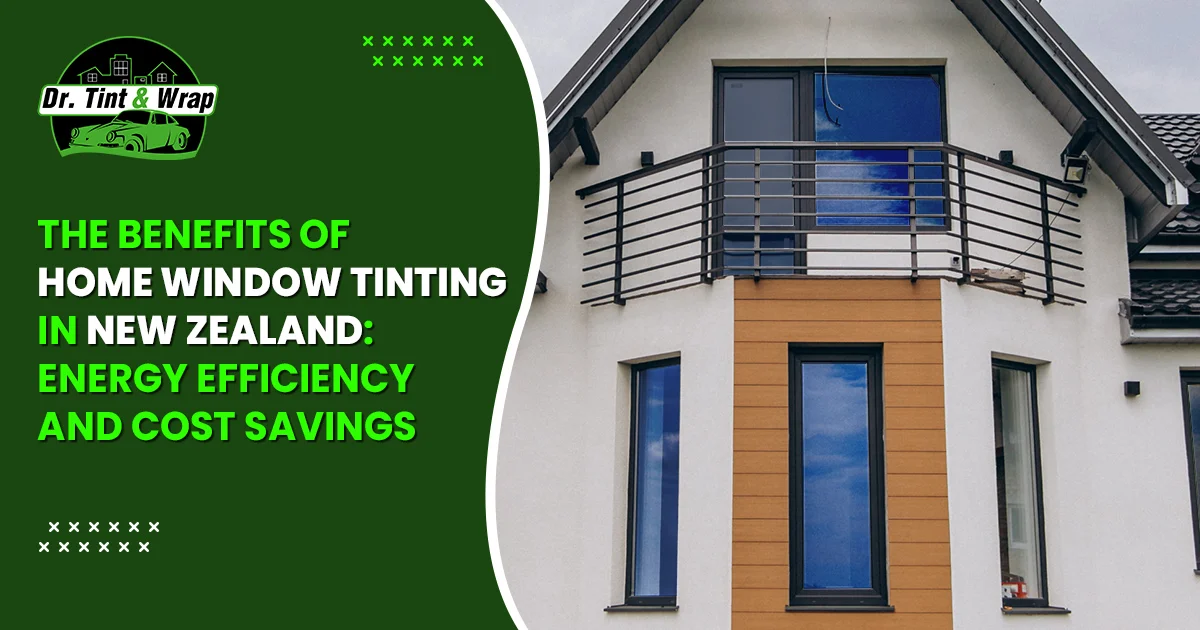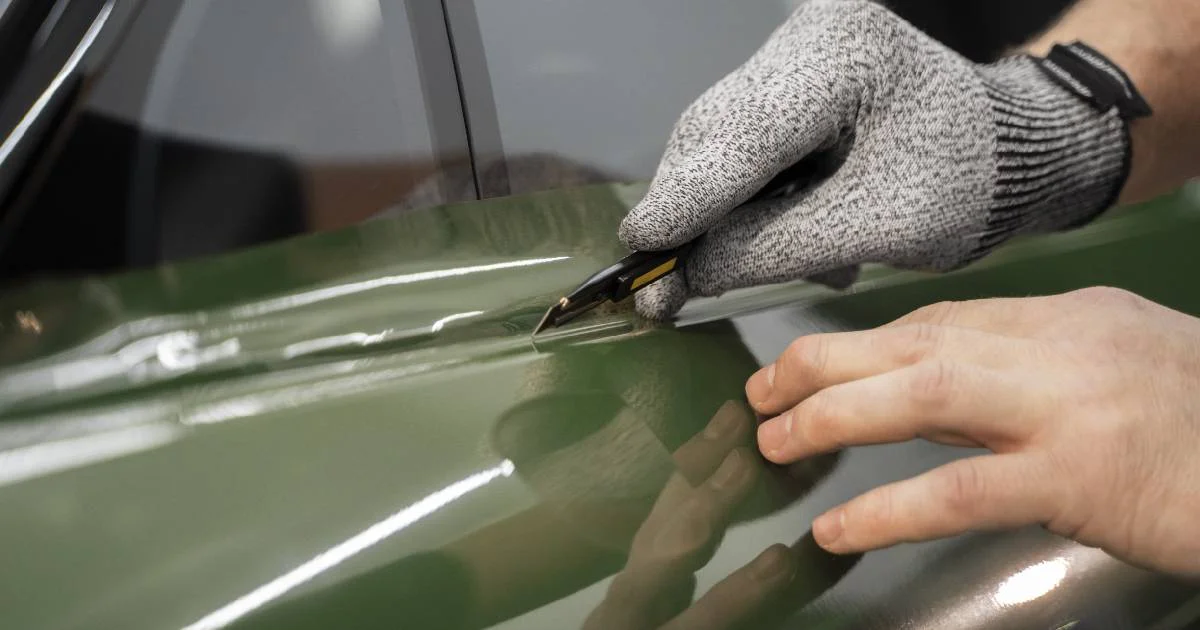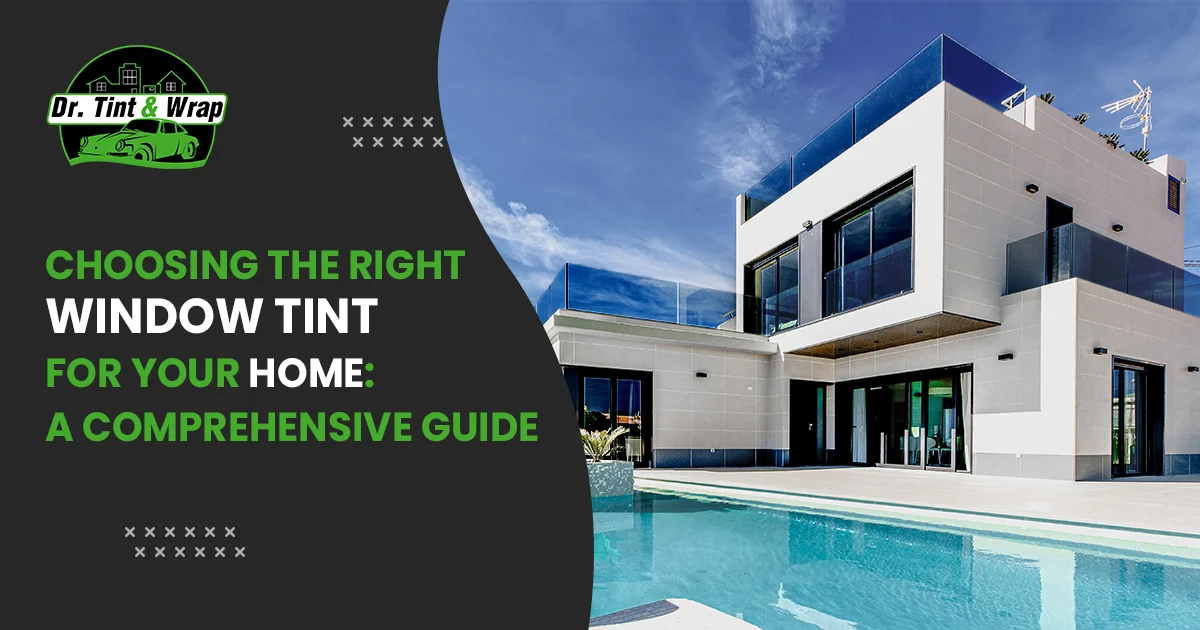
The Cost of Car Window Tinting in Tauranga: Factors to Consider
18 Jul 2023, By AdminCar window tinting is a popular automotive modification that offers numerous benefits such as increased privacy, reduced heat and glare, and improved aesthetics. If you reside in Tauranga and are considering tinting your car windows, it's essential to understand the factors that influence the cost of this service. By considering these factors, you can make an informed decision and ensure you get the best value for your money. In this article, we will explore the key elements to consider when estimating the cost of car window tinting in Tauranga.
1. Window Film Quality
The quality of the window film is a significant determinant of the cost. Window films are available in various types, including dyed film, carbon film, ceramic film, and more. Each type differs in terms of durability, heat rejection, UV protection, and appearance. High-quality films may cost more upfront but offer better performance and longevity, making them a worthwhile investment.
2. Number of Windows
The number of windows to be tinted greatly affects the overall cost. Tinting prices are typically calculated per window, so the more windows you wish to tint, the higher the total cost will be. Consider which windows you prioritize for tinting based on your specific needs, such as the rear windshield or the front side windows.
3. Complexity of Installation
The complexity of the installation process can impact the cost. Windows with intricate shapes, curves, or obstructions, such as defrosting wires or antenna lines, may require more time and effort for a precise application. Consequently, the more intricate the installation, the higher the cost is likely to be.
4. Tinting Laws and Regulations
Before tinting your car windows, familiarize yourself with the local laws and regulations in Tauranga. Each region has specific guidelines regarding the allowable tint levels for different windows. Violating these regulations can lead to fines or even the requirement to remove the tint. It's important to work with a professional tinting service that is knowledgeable about these regulations to avoid any legal issues.
5. Reputation and Expertise of the Tinting Service
The reputation and expertise of the tinting service provider can also impact the cost. Well-established and reputable companies may charge higher prices due to their experience, quality of work, and customer satisfaction. However, it's crucial to balance the cost with the quality of service provided. Reading reviews, seeking recommendations, and researching the track record of the tinting service will help you make an informed decision.
Dr. Tint & Wrap Tauranga is renowned for its exceptional car window tinting services, setting the standard for quality and expertise in Tauranga. With their unparalleled craftsmanship and attention to detail, they deliver the best car window tinting solutions, ensuring optimal privacy, security, and customer satisfaction. When considering car window tinting in Tauranga, it's essential to evaluate various factors that influence the cost.

The Benefits of Home Window Tinting in New Zealand: Energy Efficiency and Cost Savings
18 Jul 2023, By AdminWhen it comes to enhancing the comfort and functionality of your home, window tinting is a solution that often goes unnoticed. In New Zealand, where climate variations are common, the benefits of home window tinting extend far beyond aesthetic appeal. In this article, we'll explore how home window tinting can significantly reduce your energy bills and lead to long-term cost savings, making it a smart investment for homeowners across the country.
Understanding the Energy Efficiency of Window Tinting
New Zealand experiences a range of weather conditions throughout the year, from scorching summers to chilly winters. During these extremes, the energy used to regulate indoor temperatures can skyrocket. This is where window tinting comes into play.
1. Heat Reduction: One of the primary benefits of window tinting is its ability to reduce heat gain. Tinted windows block a significant portion of the sun's heat and harmful UV rays from entering your home. As a result, your indoor spaces remain cooler during hot summer months, reducing the need for air conditioning.
2. Insulation: Window tinting also provides insulation benefits, helping to maintain a consistent indoor temperature. In winter, it helps to keep warmth inside, reducing the need for excessive heating.
Cost Savings Through Window Tinting
Now, let's delve into how these energy-efficient qualities translate into tangible cost savings for homeowners in New Zealand.
1. Lower Energy Bills: By reducing heat gain during the summer and heat loss during the winter, window tinting significantly reduces your reliance on heating and cooling systems. As a result, you'll see a noticeable drop in your energy bills year-round.
2. Extended Appliance Lifespan: Reduced reliance on air conditioners and heaters not only saves you money on electricity but also extends the lifespan of these appliances. They don't have to work as hard, which means fewer repairs and replacements.
3. Furniture and Flooring Preservation: Window tinting also blocks harmful UV rays that can cause fading and damage to your furniture, flooring, and décor. This means you won't have to spend as much on replacing or refurbishing these items.
4. Enhanced Home Value: A home with energy-efficient features like window tinting can command a higher resale value in the New Zealand real estate market. Potential buyers are often willing to pay more for a home with reduced energy costs.
In New Zealand, where energy efficiency and sustainability are becoming increasingly important, home window tinting stands out as a practical investment for homeowners. By reducing energy bills, extending the lifespan of appliances, preserving your interior, and enhancing your home's value, window tinting offers numerous long-term cost-saving benefits.
So, if you're looking to make your New Zealand home more energy-efficient and cost-effective, consider investing in professional window tinting services. Not only will you enjoy a more comfortable living space, but you'll also contribute to a greener and more sustainable future while saving money in the process.

10 Things You Should Know Before Car Wrapping
18 Jul 2023, By AdminIn the world of vehicle customization, car wrapping has become increasingly popular. Whether you're looking to give your car a fresh new look or advertise your business on the go, car wrapping offers a versatile and affordable solution. However, before diving into the world of vinyl wraps, there are several key factors to consider. In this blog post, we'll explore 10 things you should know before car wrapping.
- Car Wrapping: Car wrapping involves applying a vinyl film to the exterior of a vehicle. This film can come in a variety of colors, finishes, and textures, allowing for endless customization options.
- Temporary Transformation: Unlike paint, car wraps are not permanent. They can be easily removed without damaging the vehicle's paint underneath. This makes car wrapping an ideal option for those who like to change up their car's appearance frequently.
- Cost Considerations: While car wrapping is generally more affordable than a custom paint job, it's still an investment. The cost can vary depending on the size of the vehicle, the complexity of the design, and the quality of the vinyl used.
- Quality Matters: Opting for high-quality vinyl and professional installation is crucial for a long-lasting and visually appealing wrap. Cheaper materials may fade or peel over time, detracting from the overall look of your vehicle.
- Surface Preparation: Proper surface preparation is essential for a successful car wrap. The vehicle's exterior must be thoroughly cleaned and free of any dirt, wax, or debris that could affect adhesion.
- Durability and Maintenance: A well-installed vinyl wrap can last several years with proper care. However, it's essential to follow manufacturer recommendations for maintenance, which may include avoiding harsh chemicals and abrasive cleaning methods.
- Design Considerations: When designing your car wrap, consider factors such as visibility, readability (for advertising wraps), and overall aesthetic appeal. Work closely with your designer to ensure your vision is accurately translated onto the vehicle.
- Legalities and Regulations: Before applying a car wrap, familiarize yourself with local laws and regulations regarding vehicle modifications. Certain colors or designs may be restricted, especially for commercial vehicles.
- DIY vs. Professional Installation: While DIY car wrapping kits are available, professional installation is often recommended for the best results. Professional installers have the experience and expertise to ensure a seamless finish and minimize the risk of errors.
- Removal Process: When the time comes to remove your car wrap, it's essential to do so carefully to avoid damaging the underlying paint. Professional removal services can help simplify this process and ensure a smooth transition back to the vehicle's original appearance.
In conclusion, car wrapping offers a convenient and customizable way to transform your vehicle's appearance. By understanding these key considerations before diving into a car wrapping project, you can ensure a successful outcome that enhances the look and value of your vehicle. Whether you're looking to make a statement on the road or promote your business, a professionally installed car wrap can help you achieve your goals with style and versatility.

Choosing the Right Window Tint for Your Home: A Comprehensive Guide
18 Jul 2023, By AdminWindows are the eyes of your home, providing natural light, ventilation, and a connection to the outside world. However, they can also be a source of problems, such as excessive heat, glare, and harmful UV rays. Window tinting offers a practical solution to these issues, but selecting the right window tint can be a daunting task. In this guide, we'll walk you through the process of choosing the appropriate window tint for your home based on your specific needs, climate, and window types.
1. Assess Your Needs:
Before diving into the world of window tinting, it's crucial to assess your specific requirements. Consider the following factors:
- Privacy: Do you need increased privacy without sacrificing natural light?
- Heat Reduction: Is your home excessively hot, especially during summer months?
- Glare Reduction: Do you struggle with glare from sunlight that affects your comfort and visibility?
- UV Protection: Are you concerned about fading furniture and flooring due to UV rays?
- Energy Efficiency: Are you looking to reduce energy costs by improving insulation?
2. Understand Different Types of Window Tints:
There are various types of window tints available, each designed to address specific issues:
- Solar Control Films: Ideal for heat and glare reduction, these films block UV rays and improve energy efficiency.
- Privacy Films: These tints provide privacy during the day while allowing natural light to enter your home.
- Security Films: Reinforce your windows for added security, protecting your home from break-ins and accidents.
- Decorative Films: Enhance aesthetics with decorative window films available in various patterns and designs.
3. Consider Your Climate:
The climate of your region plays a significant role in choosing the right window tint:
- Hot Climates: Opt for tints with high solar heat rejection and UV protection to keep your home cool and protect from sun damage.
- Cold Climates: Look for tints with insulating properties to retain indoor heat during winters, reducing heating costs.
4. Think About Window Types:
Different window types require different tinting solutions:
- Double-Pane Windows: Consult with a professional, as certain films can trap heat between the panes, potentially causing damage.
- Low-E Coated Windows: Use tints recommended by the window manufacturer to maintain the Low-E coating's effectiveness.
- Older Windows: Consider films that provide insulation, improving energy efficiency in older, less insulated windows.
5. Seek Professional Advice:
While there are DIY tinting kits available, consulting with a professional window tinting service is invaluable. They can assess your specific needs, recommend suitable products, and ensure proper installation, maximizing the tints' effectiveness and longevity.
6. Read Reviews and Get Samples:
Research online reviews and testimonials to learn about other homeowners' experiences with specific window tints. Additionally, request samples from manufacturers or service providers to physically see how different tints look and perform in your home environment.
7. Maintenance and Warranty:
Consider the maintenance requirements and warranty offered with the window tint. Some tints may require special cleaning methods to preserve their effectiveness, while others come with comprehensive warranties, ensuring long-term satisfaction.
In conclusion, choosing the right window tint for your home involves careful consideration of your specific needs, the climate you live in, and the types of windows you have. By understanding these factors and seeking professional guidance, you can enhance your home's comfort, energy efficiency, and overall aesthetics, making an informed choice that you'll appreciate for years to come.
